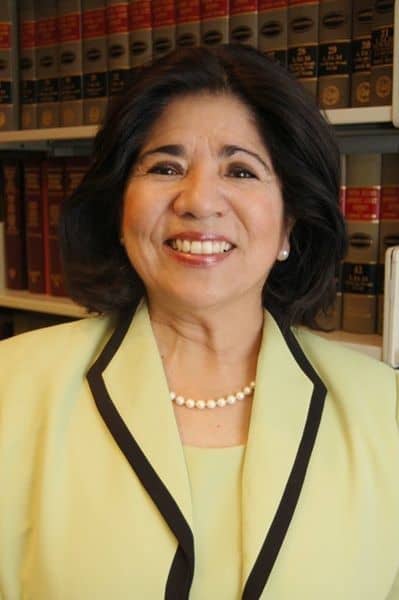
By Judge Margarita Bernal

Judge Margarita Bernal has taught Special Court Jurisdiction, regular and advanced, 24 times and will make it 25 in June. She was the first Latina ever appointed to her Tucson, Arizona, municipal court bench and served 26 years before taking early retirement in 2011.
“Retirement” is a misnomer in her case, because instead of settling into a life of leisure, she finds herself at the flashpoint of an intense national legal debate. She serves as a criminal defense attorney for immigrants.
Many of the former judge’s clients are undocumented immigrants from Latin America who have been arrested but can’t get a hearing in Immigration Court. The NJC hosted 14 Immigration Court judges, including Chief Immigration Judge MaryBeth Keller, last month. Keller said at the time that the Immigration Courts faced a backlog of more than a half-million cases.
While the arrested wait for their hearing, many get arrested again for offenses such as driving without a license or for a traffic infraction. Bernal then represents them as they face prosecution and deportation through the criminal court system.
Bernal said her work is rewarding when she can help clients get their charges dismissed or a minimal sentence. It’s bittersweet when she has to call their families with bad news.
She said she has also come to know the harsh reality of many immigrants’ lives. Often they were threatened by gangs or forced to pay “protection fees” in their home country. She meets women who feared sexual or physical assault if they remained in their village.
Yet most actually want to return to their homes, she said.
“Most immigrants just want to work, make enough money to get by, and go back to their families,” Bernal said. “It’s a misconception that they want to stay here forever. They wouldn’t be here in the first place if they had the ability to make decent wages and prosper in their home countries.”
Bernal said she has actually noticed a decline in her own caseload in criminal court because of the recent uncertainty around the enforcement of immigration laws. This may be leading to fewer illegal crossings and arrests in her area, she said. It doesn’t mean that conditions have improved in people’s home countries, only that immigration poses a new set of dangers.
Related Course
Special Court Jurisdiction & Special Court Jurisdiction Advanced (JS 611)
June 5 – 15, 2017 | Location Reno, NV | Tuition $1,699 | Conference Fee $569

Happy October, Gaveliers faithful. Are you loving this or what? No one believed a team made up of judges...


Hon. Diane J. Humetewa, the first Native American woman and the first enrolled tribal member to serve as a ...

Retired Massachusetts Chief Justice Margaret H. Marshall has been selected as the 2024 winner of the presti...

Dear Gaveliers Fans: I am delighted to announce the appointment of our first Gaveliers coaches, profiled...
